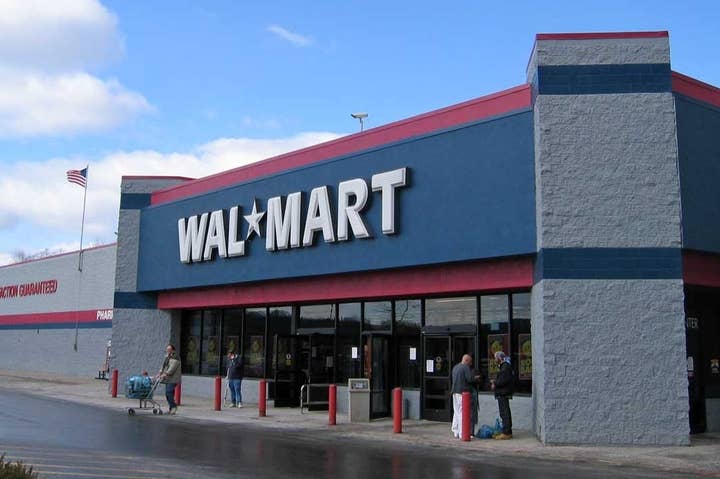Walmart jumps into the game trade-in business
Retailer launching large-scale program at 3,100 US stores, aims to disrupt second-hand market
While a few competitors have tried to make inroads over the years, when it comes to the better-than-$2 billion per year used game business, GameStop has had a pretty secure lock on king of the hill status. Starting March 26, though, the world's largest retailer will be looking to steal a significant piece of the pie.
Walmart has announced plans to launch a large-scale video game trade-in program at 3,100 stores across America. Working in conjunction with CE Exchange, the store will allow consumer to swap games for store credit, which can be used to purchase anything that Walmart sells. Used games could be available to in-store shoppers as early as this summer.
"Ultimately, we want to pay more for games than anybody else and let [customers] pay less."
Duncan Mac Naughton
And while the retailer avoided directly naming GameStop in discussing the program, it made it clear that it was gunning for the game chain.
"Ultimately, we want to pay more for games than anybody else and let [customers] pay less," said Duncan Mac Naughton, executive vice president, chief merchandising and marketing officer for Walmart.
Walmart plans to accept games for all existing console systems - from the Wii, Xbox 360 and PlayStation 3 to next generation titles. (It will not accept game hardware.) Mac Naughton says trade-in prices will, of course, vary depending on a title's popularity, but he expects the average price paid per game to be around $35.
"Our customers have been interested in used games for many years - and we've been working with partners to enter this business for many years. We just couldn't find a model that worked for our customers," added Laura Phillips, senior vice president of entertainment for Walmart.
With CE Exchange acting as a database repository for the value of games, Walmart associates will simply scan the game's UPC code (after first checking it for scratches and cracks) - with the trade-in value automatically being entered from there.
Walmart, of course, has danced around the used game business before, launching a pilot program in 2009, but never expanding that. With the shift in console generations, though, (as well as the new partner), the company decided it was time to commit.
"We think due to the size of this business and the role we can play in disrupting it, that the timing is good right now," says Mac Naughton.
Publishers have generally been resistant to expanding the number of stores trading and selling used games, since they don't receive a portion of those sales. Mac Naughton brushed off questions about feedback from game makers, saying they were 'excited' by the move, but declining to speak further for them. Instead, he chose to focus on the appeal and benefit of the program for consumers.
"In working with our suppliers, what we're excited about is growing the market," he said. "We know consumers are going to love the great content we will offer."
(GI.biz reached out to several publishers to get their thoughts on Walmart's move. None said they were "excited" about it - as Mac Naughton suggested - but, not surprisingly, none wanted to risk the wrath of their largest retail partner and declined to comment on the record.)
"We think being on the shoulders of disruptive tech is good. We're ready to grow into digital as that business emerges."
Duncan Mac Naughton
Walmart's move towards embracing used games comes at a curious time, given the industry's ongoing shift towards digital downloads. Walmart execs say they're not worried about that, though, since not all of the store's customer base is equipped to download large files. However, notes Mac Naughton, digital remains firmly on the company's radar.
"We think being on the shoulders of disruptive tech is good," he says. "We're ready to grow into digital as that business emerges."
So why the push? Simple... It's easy money, especially given the number of non-digitally inclined shoppers. GameStop's profits from the sale of used games are roughly 25 percent higher than what the company earns from new titles. Transition that sort of margin to sales on the Walmart level and investors get really, really happy - assuming Walmart can pull it off.
The fact is: Used games aren't an easy business. Toys R Us, Target, and several other major retailers have tried to get into them before, but abandoned their tests. Allocating inventory among stores can quickly become a logistics nightmare. And predicting which games will have a high resale value requires an in-depth forecasting model.
It's also labor intense. Store clerks need to know how to examine a disc to determine if it's damaged-and even among people who are trained in that, it's an inexact science. GameStop says it has to fix approximately 14 million used games each year before reselling them.
Walmart thinks it has things figured out though - and it's set to use its size and market share to become a major player in the space - and using that strength to drive sales of its new games as well.
"I think the market value we're offering is going to be what motivates the [game] owner," says Mac Naughton. "[But] new games will remain the focus of our business. ... We're really excited about capturing new release market share."

